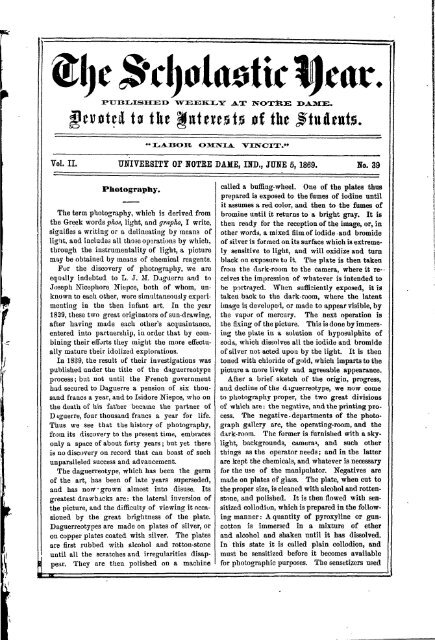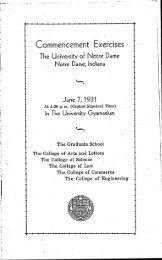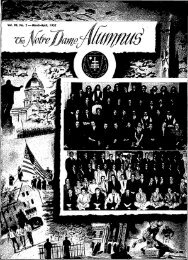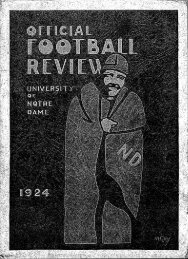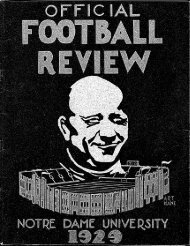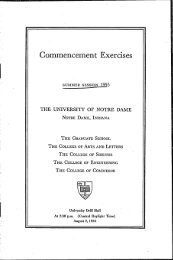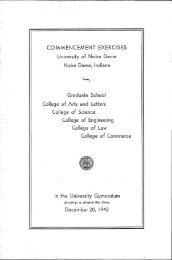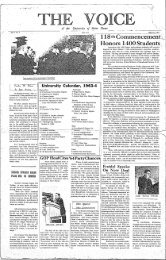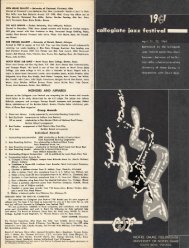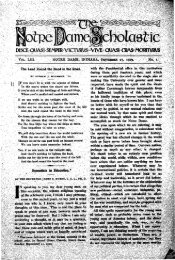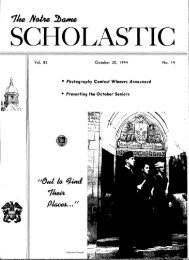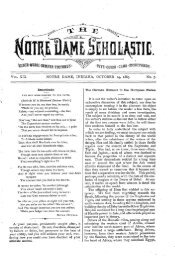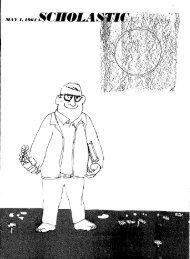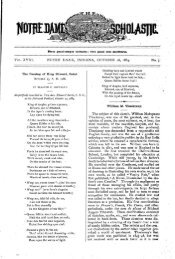Notre Dame Scholastic, Vol. 02, No. 39 -- 5 June 1869 - Archives ...
Notre Dame Scholastic, Vol. 02, No. 39 -- 5 June 1869 - Archives ...
Notre Dame Scholastic, Vol. 02, No. 39 -- 5 June 1869 - Archives ...
Create successful ePaper yourself
Turn your PDF publications into a flip-book with our unique Google optimized e-Paper software.
icuotcjl t0 the itttcwsts 0f tk f tufljttts.<br />
• 3L.A.IJOIt OaijVIJk. VEVCIT."<br />
<strong>Vol</strong>. II. ITNIVEESITY OP NOTRE DAME, IND., JUNE 5, <strong>1869</strong>. <strong>No</strong>. <strong>39</strong><br />
i<br />
Photography.<br />
The term photography, which is derived from<br />
the Greek words phon, light, and grapTio, I write,<br />
signifies a writing or a delineating by means of<br />
ligiit, and includes all those operations by which,<br />
through the instrumentality of light, a picture<br />
may be obtained by means of chemical reagents.<br />
For the discovery of photography, we are<br />
equally indebted to L. J. M. Daguerre and to<br />
Joseph Nicephore Niepce, both of whom, unknown<br />
to each other, were simultaneously experimenting<br />
in the then infant art. In the year<br />
18<strong>39</strong>, these two great originators of sun-drawing,<br />
after having made each other's acquaintance,<br />
entered into partnership, in order that by combining<br />
their efforts they might the more effectually<br />
mature their idolized explorations.<br />
In 18<strong>39</strong>, the result of their investigations was<br />
published under the title of the daguerreotype<br />
process; but not until the French government<br />
had secured to Daguerre a pension of six thousand<br />
francs a year, and to Isidore Niepce, who on<br />
the death of his father became the partner of<br />
D-iguerre, four thousand francs a year for life.<br />
Thus we see that the history of photography,<br />
frijra its discovery to the present time, embraces<br />
only a space of about forty years; but yet there<br />
is no discovery on record that can boast of such<br />
unparalleled success and advancement.<br />
The daguerreotype, which has been the germ<br />
of the art, has been of late years superseded,<br />
and has now'grown almost into disuse. Its<br />
greatest drawbacks are: the lateral inversion of<br />
the picture, and the difficulty of viewing it occasioned<br />
by the great brightness of the plate.<br />
Daguerreotypes are made on plates of silver, or<br />
on copper plates coated with silver. The plates<br />
are first rubbed with alcohol and rottou-stone<br />
until all the scratches and irregularities disappear.<br />
They are then polished on a machine<br />
called a buffing-wheel. One of the plates thtis<br />
prepared is exposed to the fumes of iodine until<br />
it assumes a red color, and then to the fumes of<br />
bromine until it returns to a bright gray. It is<br />
then ready for the reception of the image, or, in<br />
other words, a mixed filmof iodide and bromide<br />
of silver is formed on its surface which is extremely<br />
sensitive to light, and will oxidize and turn<br />
black on exposure to it. The plate is then taken<br />
from the dark-room to the camera, where it receives<br />
the impression of whatever is intended to<br />
be portrayed. When sufficiently exposed, it is<br />
taken back to the dark-room, where the latent<br />
image is developed, or made to appear visible, by<br />
the vapor of mercury. The next operation is<br />
the fixing of the picture. This is done by immersing<br />
the plate in a solution of hyposulphite of<br />
soda, which dissolves all the iodide and bromide<br />
of silver not acted upon by the light. It is then<br />
toned with chloride of gold, which imparts to the<br />
picture a more lively and agreeable appearance.<br />
After a brief sketch of the origin, progress,<br />
and decline of the diguerreotype, we now come<br />
to photography proper, the two great divisions<br />
of which are: the negative, and the printing process.<br />
The negative-departments of the photograph<br />
gallery are, the operating-room, and the<br />
dark-room. The former is furnished with a skylight,<br />
backgrounds, camera^, and such other<br />
things as the operator needs; and in the latter<br />
are kept the chemicals, and whatever is necessary<br />
for the use of the manipulator. Jfegatives are<br />
made on plates of glass. The plate, when cut to<br />
the proper size, is cleaned with alcohol and rottenstone,<br />
and polished. It is then flowed with sensitized<br />
collodion, which is prepared in the following<br />
manner: A quantity of pyroxyline or guncotton<br />
is immersed in a mixture of ether<br />
and alcohol and shaken until it has dissolved.<br />
In this state it is called plain collodion, and<br />
must be sensitized before it becomes available<br />
for photographic purposes. The sensetizers used
306 THE SCHOLASTIC YEAR.<br />
for this purpose are iodides and bromides. A<br />
quantity of each kind, dissolved in. alcohol or<br />
•water, as the case may be, is mixed with the plain<br />
collodion, which, after standing for a day or two,<br />
is ready for use. The collodionized plate is next<br />
immersed in the silver bath, a solution of nitrate<br />
of silver and distilled water containing about<br />
forty five grains of silver to the fluid ounce of<br />
water. While the. plate remains in the bath it<br />
receives a coating of silver whicli is_ converted<br />
into iodide and bromide of silver by means of the<br />
iodide and bromide in the collodion film. In<br />
this state the plate is extremely sensitive to light,<br />
and all subsequent operations, the exposition in<br />
the camera excepted, must be performed in the<br />
dark-room. The plate is then inserted in the<br />
plate-holder, which is a square tablet having a<br />
hinged door on one side and a slide on tlie other,<br />
both of which must fit so closely as to exclude the<br />
light. The tablet containing the sensitized<br />
plate is then fixed in its proper place in the<br />
, camera, the slide is drawn, and the image of the<br />
subject to be photographed, carried through the<br />
lenses, is reflected, in focus, upon the sensitive<br />
surface. The light thus admitted to tlie plate<br />
forms an oxide of silver wherever it happens to<br />
strike it. As soon as it has been sufficiently exposed,<br />
it is taken back to the dark-room and<br />
flowed with the developing solution, which is a<br />
mixture of water, acetic acid and protosulphate of<br />
iron.<br />
As soon as the developer has covered the plate,<br />
the latent image begins to appear, and step by<br />
step it advances until all the outlines become<br />
visible. When the operation has proceeded far<br />
enough, the plate is held under a stream of water,<br />
which stops the advance of the image by removing<br />
the iron. The plate is then immersed in the<br />
fixing bath of hyposulphite of soda, which dissolves<br />
all-the undecomposed iodide and bromide<br />
of silver. It is then washed, dried and varnished,<br />
and given to the printer.<br />
[TO BE COXTINTJED.]<br />
- Tera most favorable reports reach us from all<br />
sides, and we augur from these that the Competitions<br />
this year will even surpass in excellence<br />
those of last year.<br />
MANY GRABTJATES have already responded to<br />
the circular letter sent to them by the Secretary<br />
of the resident Committee, and propose to be<br />
present at the Commencement.<br />
"Dear Erin O!"<br />
BY COZ.<br />
[From the Irish.]<br />
Tlie sun is rising o'er the hills,<br />
His rays are sparkling ou the rills,<br />
Fast roll the chariot's glowing wheels,<br />
And sad tears flow<br />
Adown my care-worn, sunken cheeks,<br />
While gazing on thy sunlit peaks.<br />
Thy grassy plains and winding creeks—<br />
Dear Erin 01<br />
I climh the lofty vessel's side,<br />
liike cradle rocking with the tide.<br />
To cross the treacherous ocean wide.<br />
In grief and wo—<br />
And sighing, view each cherished spot.<br />
Each glen and grove, and sacred grot,<br />
Which seen but once, are ne'er forgot—<br />
Dear Erin 0!<br />
The noontide sun now brighter beams,<br />
Tlie glassy sea more aznre seems,<br />
like snow the billowy canvas gleams.<br />
While on wo go —<br />
But, fonder, far, fair Isle, to me<br />
Than beaming sun or azure sea<br />
Are the sweet tho'ts of/tome and thee—<br />
Dear Erin 01<br />
How blest the dwellers in thy vales.<br />
Who heed nor sea nor snow> sails,<br />
<strong>No</strong>r golden orb, whose splendor pales<br />
In sunset's glow—<br />
But toil in peace, or sportive play.<br />
Or chant thy poet's lofty l»y,<br />
From dewy morn till close of day-<br />
Dear Erin 0!<br />
The sun is sinking in the sea.<br />
The clouds of night encircle me<br />
While musing, all alone, of thee.<br />
In silent wo—<br />
Bat freedom's star shall gild the skies,<br />
To glad again these tearful eyes,<br />
And see thee, Phoenis-like, arise—<br />
Dear Erin 0!<br />
My fathers' home—my native land—<br />
Proud mother of tlie bravesc hand<br />
Tliat ever at a chief's command<br />
Drew blade or bow.—<br />
The Saxon's grasp doth now profane,<br />
As erst did that of pirate Dane,<br />
But vengeance shall be thine again—<br />
Dear Erlu 0!<br />
Onr Exchanges.<br />
Prominent among our numerous exchanges we<br />
are happy to rank the Tale Literary Magazine,<br />
and its companion, The College Courant. The<br />
former, a" monthly, enters upon its thirty fourth<br />
year, hale and hearty, with a new corps of editors<br />
and with renewed vigor. The Patriarch of the
THE SCHOLASTIC TEAR, 307<br />
race, it wears its honors gracefully, and, like<br />
Atlas supporting the ponderous globe, bears<br />
with dignity the weighty burden of many revolving<br />
years.<br />
Its raison d'etre may be inferred from the classical<br />
motto that graces its title-page:<br />
"Dura mens grata manet, nomen laudesque Talenses<br />
Cantabuat SOBOLES unanimique PAIRES."<br />
The principal articles in the May <strong>No</strong>. are:<br />
"Knee-breeches—The Lit.'s Raison d'etre—Winter<br />
—Rats—Old China—Light Reading—A New<br />
Comedy of an Old Error—Can I be a Gentleman<br />
—Secret Societies—Jlemorabilia—Editors' Table<br />
—Editors' Greeting."<br />
The second, a rather robust weeMy, can boast<br />
of almost as many leaves as a birch-tree, and certainly<br />
bears more refreshing fruit! Its cheering<br />
motto, " Perseverantia omnia vincit," is somewhat<br />
akin to our "iiSa?* omnia vincit" and both are<br />
well worthy being written in letters of gold, and<br />
imprinted upon the heart and mind of every<br />
toiler in the broad field of literature; but " kic<br />
labor, hoc opus est!"<br />
That both hebdomadal and mensal may live<br />
long and happily, in the enjoyment of many a<br />
"ScffoLASTic YEAR," is the sincere wish of<br />
"NOTRE DAME"!<br />
C 03L.3L.EGH:<br />
B. 'J3:-3:-EXIJV.<br />
Tables of Honor.<br />
SENIOR DEPARTMENT.<br />
May 23th.—J. E.l wards, A. Reilly, E. Thomas,<br />
D. Tighe, H. Schnelker, T. Kinsella, J. Carroll,<br />
L. Schmeider, J. Cunnea, D. J. Dienaer.<br />
JuKioB DEPARTMENT.<br />
May 28th.—P. Curtis, H. Hayes, J. Coppinger,<br />
J. Deeban, W. Odendahl, C. J. O'Neil, H. Morgan,<br />
C. Hutchings, G. Combs, H. Breckweg, J.<br />
Ward.<br />
Associated Alumni.<br />
NOTRE DAME, May 25th, <strong>1869</strong>.<br />
At a special meeting of the Standing Committee<br />
of the Associated Alumni, called by order<br />
of the chairman, it was resolved that a report<br />
of the proceedings of the meeting and the<br />
rules and regulations of the Association be published<br />
anew in THE SCHOLASTIC TEAR, and that<br />
a copy be sent to all the members, that there<br />
may esist no doubt as to the day on which the<br />
banquet will take place and the time and place<br />
of the formal reception and business m.eeting.<br />
The banquet will take place on Tuesday, the<br />
22d of <strong>June</strong>. The day will open with solemn<br />
Mass at 6 o'clock: the reception will be held in<br />
the large parlor of the College, at 9J^ o'clock;<br />
the business meeting will commence at 10 o'clock,<br />
and the banquet at 1 o'clock P. M., to be followed<br />
by dramatic performances in the evening. .A<br />
committee of reception was appointed, consisting<br />
of Rev. M. B. Brown, Profi. Lyons, Ivers,<br />
Stace, Baasen and Johnson.<br />
After discussing some details, unimportant to<br />
the public, the meeting adjourned.<br />
M. T. CouBT,<br />
Sec^y of Standing ^Committee.<br />
MINUTES OP Tm: ALUMNI AT WHICH THE CON<br />
STITUTION WAS ADOPTED.<br />
On Thursday, at 10^ A M., <strong>June</strong> 23d, 1868, the<br />
Alumni assembled in the President's parlor for the<br />
purpose of organizing an association to be known<br />
as the " Associated Alumni of <strong><strong>No</strong>tre</strong> <strong>Dame</strong> University."<br />
Rev. Wm. Corby, President of the University,<br />
was, by acclamation, appointed'Chairman,<br />
and Rev. N. H. Gillespie Secretary pro tern.<br />
Having proceeded to the election of officers, .it resulted<br />
as follows:<br />
President—Rev. N. H. Gillespie, A. M., <strong><strong>No</strong>tre</strong><br />
<strong>Dame</strong>, Indiana.<br />
1st Vice-President—F. Bigelow, A. M., Dayton,<br />
Ohio. . :•<br />
2nd VicePresideniH-J. B.,Rnnnion, A. M.,<br />
Chicago, Illinois.<br />
Treasurer—^Prof. J. A. Lyons, A. M., <strong><strong>No</strong>tre</strong><br />
<strong>Dame</strong>, Indiana.<br />
Secretary—Prof. M. T. Corby, A. M., Detroit,<br />
Mich.<br />
Orator for next Commencement—^Rev. E. B. Kilroy,<br />
A. M., Port Sarnia, Canada. Altemate—<br />
James O'Brien, A. M., Galena, HI.<br />
Poet—Prof. T. E. Howard, A. M., <strong><strong>No</strong>tre</strong> <strong>Dame</strong>.<br />
Altemate—^Prof. A. J. Stace, A. M., <strong><strong>No</strong>tre</strong> <strong>Dame</strong>.<br />
The Constitution as handed in by the Secretary<br />
of the Standing Committee was then discussed,<br />
altered and amended, and. now stands- as<br />
follows:<br />
The name of the Association shall be the "Associated<br />
Alumni of the University of <strong><strong>No</strong>tre</strong> <strong>Dame</strong>."<br />
The object of the Association is defined to be:<br />
To preserve and strengthen the common tie.tfaat
» UlM-'jni^ ]i JJfl<br />
4*<br />
-•a<br />
308 THE SCHOLASTIC TEAR,<br />
binds DS to each other and Alma Mater, by means<br />
of yearly reunions and by literary corresjjondence.<br />
The regular yearly meeting to take place on<br />
that Tuesday in the month of <strong>June</strong> next preceding<br />
the Annual Commencement of the University,<br />
when the order of business will be as follows:<br />
Calling of the roll.<br />
Elections. First, of members, according to the<br />
conditions of eligibility specified below. (Members<br />
thus elected will be invited to attend the<br />
same meeting.) Second, of the officers of the Society,<br />
to consist of a President, two Vice-Presidents,<br />
Treasurer, Secretary, Orator and Poet, with<br />
their alternates, for the coming year. The first five<br />
of these officers to be chosen from among the regular<br />
graduates; the last four, namely the Orator<br />
and Poet,with alternates, from among the members<br />
in general.<br />
The meeting to conclude with a sumptuous<br />
banquet, with commemorations of absent and departed<br />
friends.<br />
. The Orator and Poet to exercise their talents,<br />
in the departments assigned them respectively,<br />
at the Annual Commencement Exercises one year<br />
from the time of their election, and their effusions<br />
to be published, with the general statistics of the<br />
Association, in an Annual Report.<br />
Membtrahi'p.—1st. All, regular graduates in the<br />
Classical and Scientific courses of <strong><strong>No</strong>tre</strong> <strong>Dame</strong><br />
University, and all who have received honorary<br />
degrees, are members ipso facto.<br />
2d. All those who have ever held the offices of<br />
President, Vice-President or Prefect of Studies in<br />
the University are members ipso facto.<br />
3d. All who have been actively connected with<br />
the University as Professors or Students are eligible<br />
as members. The election to be by a threefourths'<br />
ballot of those voting.<br />
The members present at the regular meeting<br />
shall be the voters for officers and members.<br />
The annual fee shall consist of ten dollars.<br />
The members of the Association resident at the<br />
University of <strong><strong>No</strong>tre</strong> <strong>Dame</strong> shall constitute a<br />
Standing Committee to receive communications<br />
transact the general business of the Association,<br />
and hand in its Report at the yearly meeting.<br />
The President of the University shall be the<br />
Chairman of the Standing Committee.<br />
The members are requested to attend a Mass on<br />
the day of meeting, celebrated in behalf of all the<br />
members, living and dead, of the Association.<br />
Resolved, that the list of Graduates be prepared<br />
and published in the Catalogue, together<br />
with the report of the meeting. Rev. N. H. Gillespie,<br />
Prof Hoxvard and Rev. T. L. Vagnier were<br />
appointed a committee to select an appropriate<br />
badge and motto.<br />
Rev. J. C. Carrier was then elected a member<br />
of the Association; and on motion the meeting<br />
adjourned.<br />
M. T. COKBT,<br />
Sec'y of the Associated Alumni.<br />
Mary the only Queen of May.<br />
BY AN OU) CoNTBiBnroB.<br />
Why Tjud and Moom, ye flowers ?<br />
Why from your thuribles of tight.<br />
Upon the air w.th Buushine fair<br />
Ca?t ye the incense of y oar prayer ?<br />
Why, perfunifS, seek the azure hight?<br />
Wny smile. O earth, 'mid crystal showers ?<br />
<strong>No</strong>w, music, like the sound<br />
That on the day of Pentecost,<br />
With gentle force from heavenly source.<br />
Took it* benign transforming course<br />
Where God's beloved in prayer profound<br />
Awaited thee, O Holy Ghost S<br />
Huslc from slender bella<br />
That cluster on the Lilac stem,;<br />
From Crocus pale, that scents the gale,<br />
From fragrant Lily of the vale,—<br />
Misic arose from each of them.<br />
And still their thrilling anthem swells.<br />
The Heliotrope and Rose,<br />
The pendant, trembling, Bleeding Heart,<br />
The Puschia too, and Pansy blue,<br />
And every flower that drinks the dew,<br />
Still chant aloud their noble part<br />
In pean nevermore to close.<br />
" And what sing they ?" ye ask.<br />
O human language^ weak and faint.<br />
Ye have no tone that ear hach known,<br />
Ko dialect of either zone.<br />
To well tranblate. Angel or saint<br />
Alone were worthy of the task.<br />
'lis music in the praise<br />
Of Mary, Qaeen of sky and s^a.<br />
Queen "/MH o/groce," whose royal face<br />
"Sio artist-hand can justly trace.<br />
And yet whose loving eaie is free<br />
As the warm sun's benignant rays.<br />
O Mary! would my tongue<br />
Had heavenly eloquence untold<br />
To teach the race thy peerless grace.<br />
With power no power cuuld e'er efiace 1<br />
Then would I bind with bands of gold<br />
All hearts to serve thee, old and young.<br />
Sing on then, glorious flowers I<br />
The pure of heart can hear your song.<br />
The iaise and gay may turn away<br />
To crown some other queen of May,<br />
But unto MART doih belong<br />
The homage of these hearts of ours.
1^^<br />
THE SCHOLASTIC TEAR. script.<br />
Ang^ela'8 Day at St. Mary's Academy.<br />
The lovely Month of May has gone, to be numbered<br />
with the past, but not before leaving many<br />
pleasing recollections—among which the celebration<br />
of St. Angela's Feast, at St. Mary's, on the<br />
31st, was the last though by no means the<br />
Xeast.<br />
It has been a custom for years with the young<br />
ladies to manifest in a public manner their love and<br />
esteem for one whose name is identified with the<br />
prosperity, the continued success and, we might<br />
add, the very existence of St. Mary's Academy,<br />
MOTHER ANGELA, Superioress of the Sisters of<br />
Holy Cross in the United States.<br />
The pupils of the present year are as quick<br />
to perceive and as ready and willing to reward,<br />
as far as they are able, every effort made for their<br />
advancement in that knowledge which will make<br />
them exemplary Christians—dutiful children,<br />
faithful wives and model mothers. The joy<br />
that sparkled in every eye, and lit up every face,—<br />
to say nothing of the merry peals of joyous<br />
laughter,—told us as plainly as did the poetic<br />
verse or stately period, that they were truly happy<br />
because it was their " Mother's Feast."<br />
We were among the privileged few who were<br />
not only witnesses to, but partakers in, this<br />
" feast of beauty and flow of soul."<br />
Imagine your " occasional correspondent" about<br />
six o'clock that evening seated, in company with<br />
Rev. guests before a sumptuous board, with the<br />
very best of the season on every side and claiming<br />
his attention.<br />
I think I hear you say "Pity he did'nt forget<br />
to take dinner." 'Twas indeed; but you know<br />
my memory's best just before meals.<br />
Reluctantly leaving the delicious strawberries<br />
and luscious bananas, we walked for half an hour<br />
through the gardens and along the banks of the<br />
river, and were regaled (figuratively of course) by<br />
the enchanting scenery of the place. A signal<br />
from the chaplain cut short our reverie, and in a<br />
moment we were entering the beautiful study hall,<br />
which echoed with sweet notes of a " March" by<br />
the Misses Tong. Then came addresses from the<br />
Senior, Junior, and Miniui departments, the<br />
" French Address" and the " Greeting from the<br />
Children of Mary" each replete with good wishes,<br />
and kind words of encouragement and all pervaded<br />
by a spirit of genuine piety. We don't<br />
wish to make distinctions, because Mrs. Partington<br />
says " they are odorous;" still, no one will feel<br />
slighted or jealous if we say that little Annie<br />
Garrity deserves the palm for her earnest and<br />
natural manner of delivery.<br />
Do not imagine, gentle reader, that these addresses<br />
all came hotch-potch as I have jotted<br />
them down; no indeed. That wonderful voice of<br />
Miss Smythe's was at intervals heard, and elicited<br />
the admiration of those who have had the pleasure<br />
of hearing it from time to time; and it was appreciated<br />
even more than ever before. Then there was a<br />
fine "Fantasia," from Abb6 Liszt, by Miss Edith<br />
Lilly, and a solo from Mendelssohn by Miss<br />
Arrington. But we must hasten to the tableau,<br />
or tableaux, representing, as Miss Ella Ewing<br />
told us in a Prologue, six scenes in the life of<br />
" Mary, Queen of Scots,"—the most highly extolled<br />
and at the same time most maliciously maligned<br />
Queen of any age or nation.<br />
The first' scene, " The Infant Queen and her<br />
miniature Court playing at Royalty," was so well<br />
done that we feared that " the best of the wine had<br />
been served at the first of the feast." But we<br />
were too happily disappointed, as each tableau<br />
was fully as good if not better than the previous<br />
one. Truly little Annie Clarke looked<br />
like an artless little queen ; but those who represented<br />
the " Scottish Queen" in the subsequent<br />
scenes were quite as well adapted to their characters<br />
and as faithfully enacted their parts<br />
The tableau of the " Offering to Our Lady of the<br />
Sacred Heart" would require a poet or a painter,<br />
perhaps a poet-painter, to portray it perfectly;<br />
and, as I am neither, you will'have to excuse<br />
me from even an attempt to describe it. The<br />
feelings excited in me, and I would venture to<br />
say in all, were those of real piety' and^ filial devotion<br />
to Mary. If, mused I, Miss' Carpenter—a<br />
devout client of Mary, no doubt—could so perfectly<br />
personate her heavenly Mother; what rhnst<br />
the original look like as she received the homage<br />
of the heavenly court ? And as for little'Miss<br />
Henry, who represented the "Child Jesus," she.<br />
looked the very personification of innocence and<br />
humility.<br />
Such tableaux are as welcome to us poor pil- •<br />
grims as are the gurgling springs to the wayworn<br />
traveller of the desert. Can we not have<br />
such as this at the Annual Commencement?<br />
An "overture," from Mozart and the "Song<br />
of May," by the Vocal Class, closed the programme<br />
for the evening. <strong>No</strong>! One other<br />
feature was " The closing remarks," by the Rev.<br />
guests. Rev. Father Sullivan, of Delphi, Ind.,<br />
in a very nice speech, complimented the young
i<br />
310 THE SCHOLASTIC TEAR.<br />
ladies on the success of their entertainment, and<br />
coi-.gratulated the Eev. Mother on her festal day.<br />
The !-peaker showed the true sphere of woman, her<br />
high and holy vocation, and njoiced that there<br />
were some in those days of "woman's rights"<br />
who really appreciated their duty and sacrificed<br />
all to devote themselves to the true elevation of<br />
woman to her proper sphere. Purity, fidelity and<br />
devotedness were virtues taught by example as<br />
well as precept in the convent schools.<br />
Rev. Father Gillespie, in answer to a call, said \<br />
he was sorry that both Very Rev. Father Provincial<br />
and Father Superior were unavoidably absent,—having,<br />
however, sent their kind greetings<br />
to all. As for himself, be was pleased, as who<br />
would not be, and begged to subscribe to what<br />
his friend Father Sullivan had said. He, of.<br />
course, always bragged up the College exhibitions,<br />
but hereafter they (the College boys) must<br />
do better than they have yet done, to justify him<br />
in future comparisons. . But he was afraid that<br />
he would trespass too much on their time, as he<br />
knew others wanted, to say something, and he<br />
would yield to Father Lemounier, who, after<br />
complimenting the pupils on their success, and<br />
good Mother Angela on her feast, among her happy,<br />
loving children, very naively turned the tables<br />
on one of his friends (he has done so jjreviouslyO—Ijy<br />
saying ihat Father Spillard was anxious<br />
to say some nice things, and he would not deny him<br />
the pleasure. Was he, Father S., in " Fairie land ?"<br />
Surely the fairy scenes and silvery voices and<br />
enchanting strains were not realities? Were<br />
those not fairy voices that so sweetly warbled ?—<br />
and enchanted harps, touched by fairy fingers?<br />
He thought they were, and said that if he could<br />
•speak the fairy language he would praise, but<br />
would"risk a few word.s and finished by wishing<br />
that the 3Istof May would come round quarteily,<br />
and be celebrated as this one had been.<br />
Father Vagnier said that sc-arcely anything remained<br />
for him to say, so much bad been said<br />
already, and well said,—yet, the beautiful tableaux<br />
he had seen here on similar occasions had<br />
left pleasant memories, as those he had seen-tonight<br />
would not fail to do.<br />
Father Letourneau, the chaplain, in behalf of<br />
Mother Angela and the young ladies, returned<br />
many thanks to the Rev. guests for the pleasure<br />
of their company, and hoped all would enjoy<br />
many such pleasant I6tes. But the hour was already<br />
come for retiring, thinking all needed rest<br />
and the young ladies a limited recreation next<br />
day. The restrictions were thought obnoxious<br />
by Father Gillespie, in which opinion he was<br />
subiained by the young ladies, and, by common<br />
consent, " Recreation " was the order of the next<br />
day.<br />
-'-'AS^ wended our way college-wards how many<br />
happy" hearts, we thought, are at St. Mary's tonight<br />
; how almost incjilculable is the good accomplished<br />
in a school like this, where virtue and<br />
knowledge go hand-in-hand, and where the<br />
humble religieuse is fitting the brightest ornaments<br />
m for Christian society, and, what is better,<br />
ure souls for heaven.<br />
" OCCASIONAL."<br />
A Few Classical Remarks.<br />
Some criticism has been provoked lately by<br />
the use of the word cychrcheo&is in one of our<br />
programmes. It has been said that it cannot be<br />
found in Webster's Unabridged, and is therefore<br />
a barbarism. This is a mere cavil. Who was<br />
Webster, we should like to know ?—and what<br />
are the claims which oblige us to pin our faith<br />
to his sleeve? The word cyclorcheosis is regularly<br />
derived and compounded from the original<br />
Greek, and signifies a circular dance—Icuklos,<br />
circle; orcheomai, to dance. We have other words<br />
derived from each of these component parts.<br />
What student has not heard of a cycle—a cycloid—a<br />
cyclone—a cyclops—a cyclopjedia?—<br />
not to speak of the Ku klux so ably analyzed by<br />
TYKO in a SCHOLASTIC of last year. And from<br />
orcheomai we have "orchestra;" for all the ancient<br />
Greek orchestras used to dance. Dancins,<br />
in fact, was only discontinued on the introduction<br />
of the big fiddle, which was found to impede<br />
the saltatory movements of the performers.<br />
The inconvenience, however, might have been<br />
obviated by attaching a castor, or pantagraph<br />
wheel to the lower extremity of the violiucello;<br />
and we can hardly imagine anything more effective<br />
than a solemn hornpipe perfornaed by the<br />
leader of the orchestra, beating time with his<br />
violin bow, and followed in succession by all the<br />
fiddles, large and small, their performers carefully<br />
imitating all the gyrations of the leader.<br />
A tragedy thus accompanied would be tragedy<br />
indeed, and would immortalize the hardy individual<br />
who first attempted this improvement<br />
on the old fogy style. A grand wheelbarrow<br />
dance might conclude the whole. •<br />
While on a classical subject, we may be allowed<br />
to animadvert to the derivation of .a common QI,-
THE SCHOLASTIC YEAR, 311<br />
pressiou usually regarded as mere slang. "It<br />
does not amount to a hill of beans" is a forcible<br />
way of giving your conviction of the unimportance<br />
of something regarded by your adversary<br />
in argument as eminently consequential. <strong>No</strong>w<br />
take a good etymolngical Latin dictionary and<br />
look for the word nihilum. You will find that<br />
although it means "nothing" there is a great<br />
deal to be said about it. In the first place you<br />
are informed that it is derived from ne and<br />
hilum; and, on looking for kilum, you perceive<br />
its ancient and original meaning to be " the black<br />
speck or mark on a bean, where it was attached<br />
to the pod or shell." Does not this throw a little<br />
light on the subject? "Jfot even the hilujn of a<br />
bean " was the old classical synonym for " nothing."<br />
If they said blamelessly "it does not<br />
amount to the hilum of a bean," can we be accused<br />
of slang for saying "it does not amount to<br />
a hill of beans ?"<br />
The similar expression : " It does not amount<br />
to a row of pins," is not classical, and is unfortunately<br />
disguised by the mispronunciation of the<br />
word " row." It aught to be " row," a disturbance—not<br />
"roiD," a series or array. Perhaps<br />
the most frequent source of disturbance in the<br />
course of education is the sticking of pins by<br />
malevolence into the occupants of neighboring<br />
seats. A " row " of pins in our time was a matter<br />
of daily, and we may say hourly, occurrence, but<br />
its very frequency communicated to it a sort of<br />
insignificance which warranted the use of the expression<br />
" It does not amount to a roic of pins" on<br />
occasion of any disturbance of .small importance.<br />
If a similar pronunciation of the word " row"<br />
were adopted by our " Social Rowing Club " it<br />
would add much to the significance of their<br />
appellation. A social " row " oh the lake, however,<br />
would then—though exhilarating—become<br />
somewhat dangerous, and should be confined exclusively<br />
to members of the club. Even these<br />
might be attached to life-preservers before venturing<br />
to engage in the "row." But this is a digression.<br />
S.<br />
THE " MEMORiATi" which is intended to be<br />
published at the occasion of the Silver Jtibilee<br />
is nearly ready, thanks to the energetic, attention<br />
of the gentlemen to whom the success of the work<br />
was intrusted, also to the publishers, Messrs.<br />
Myers & Chandler, of Chicago. The book will<br />
be enriched with beautiful engravings of <strong><strong>No</strong>tre</strong><br />
<strong>Dame</strong> as it was of old and as it is now, and also<br />
with fine plates representing persons whose life<br />
has been long identified with that of the University.<br />
The " MEMORi.\Ti"—of over 275 pages—^will<br />
be replete with interesting matter.<br />
TnE EXAMINATION will be proceeded with on<br />
the plan laid out at the last February Examia<br />
ation. The same number of questions and system<br />
of noting will be observed for the Oral Examination.<br />
The Written Examination will begin<br />
on the 11th inst., and will last_l;3tQ_days.<br />
The Oral Examination will begin on Monday, "<br />
14th inst, and will last the whole week.<br />
Tbe lists of Boards of Examiners will be published<br />
in our next number, as also statistics of',<br />
the Classes, Societies, Clubs, etc.<br />
Special arrangements will be made with the<br />
officers of tbe M. S. & N. I. Railroad to accommodate<br />
our visitors at the Commencement Day.<br />
The liberal views of the gentlemen who preside<br />
over this excellent road induce us to believe that<br />
they will do all in their power to render the tiip<br />
to <strong><strong>No</strong>tre</strong> <strong>Dame</strong> an easy and pleasant one. We do<br />
not wish to recommend to our friends, in a<br />
special manner, any one of tlie hotels of South<br />
Bend: we think that the attentions paid to our<br />
visitors in the past are their best recommendation.<br />
As new hotels have been opened since a year, we<br />
have no doubt that ample room will be found to<br />
satisfy all the demands.<br />
The Secretaries of Societies, Clubs, etc, are requested<br />
to send without delay, to Prof. J. A.<br />
Lyons, the lists of officers of said Societies and<br />
Clubs.<br />
REV. FATHER SULLIVAN honored the members<br />
of the St. Cecilia Society with his presence in their<br />
meeting-room.<br />
AINT gl'ARY'S ^\CADEIVIY.<br />
Receptiou of Tcry Rev. Father General.<br />
ST. MARY'S ACADEMT, May 25,<br />
'69.<br />
The announcement of the safe arrival of our<br />
Very Rev. Father General sent a thrill of joy<br />
through many hearts. Old and young, from the<br />
highest officials to the smallest child in the Minnim<br />
department, gave vent to the delight and<br />
satisfaction felt on seeing once more our beloved<br />
and venerated Father.<br />
The pupils of St. Mary's could not possibly<br />
wait till the time appointed for his formal reception<br />
at tbatinstitution, but as soon as the big
312 THE SCHOLASTIC TEAR.<br />
bell announced his arrival they hurried over to<br />
<strong><strong>No</strong>tre</strong> <strong>Dame</strong>, to get a glimpse of one who finds<br />
^ his greatest delight in being surrounded by the<br />
young and innocent.<br />
After receiving a smiling recognition from our<br />
venerable Father, as he passed into the church at<br />
<strong><strong>No</strong>tre</strong> <strong>Dame</strong> to return thanks to God for his safe<br />
arrival, the pupils also entered and juined in the<br />
prayer of thanksgiving. Then all returned to<br />
prepare for the reception.<br />
In the afternoon of the 28th a procession was<br />
formed composed of the members of the community<br />
and the pupils of the Academy. This procession<br />
went out to meet Very Rev. Tather and<br />
escort him to the flower-garden known as the<br />
" Rosary Circle," where a summer-house had been<br />
prepared and decorated for his reception.<br />
During the procession appropriate hymns and<br />
songs of greeting were sung.<br />
On arriving at the summer-house, addresses<br />
were read from the different Departments of the<br />
school. Those from the Graduates and Seniors<br />
were expressive of their reverence and joy; those<br />
from the Minim Department -were, as usual,<br />
marked by a tone of playful familiarity and sense<br />
ofself-importancethatseemed to amuse Very Rev.<br />
Father, who, by the great notice he takes of those<br />
little people, makes them imagine they are privileged<br />
beings.<br />
The address from the Graduate Class was read<br />
by Miss E. Crouch ; that from the Senior Department<br />
by Miss Malhall. The Juniors were represented<br />
by .Misses L. McNamarra, A. Clark, and<br />
L. Niel. The Minims by little Bridget Wilson,<br />
E. Randal and C. Henry.<br />
The addresses and greetings over. Very Rev.<br />
Father made some very kind and appropriate remarks,<br />
and assured those present that lie felt quite<br />
as much joy at seeing them all well and happy<br />
as they could possibly feel at his safe return.<br />
After receiving his blessing all returned to the<br />
house, and soon after reassembled in the chapel to<br />
assist at Vespers and Benediction.<br />
Very Rev. Father was accompanied by an illustrious<br />
visitor from France, Dom Jaussion, a Benedictine<br />
Father of the Abbey of Solesmes, and also<br />
by many of the Rev. Fathers of <strong><strong>No</strong>tre</strong> <strong>Dame</strong>.<br />
These all assisted at the Vespers. It has been<br />
some time since our humble chapel presented so<br />
imposing an array of Rev. Clergy.<br />
Vespers over, a number of the pupils called on<br />
Very Rev. Father and presented a petition for a<br />
few hours' freedom from class duties on the next<br />
day, that they might enjoy the bright sunny |<br />
weather which he seemed to have brought- from<br />
" La Belle, France"—^those being the first really<br />
spring days we have enjoyed since the commencement<br />
of " Beautiful May." Their request being<br />
granted, the committee soon spread the news, and<br />
" Recreation" was telegraphed through every<br />
Department—and " Long live our dear and venerated<br />
Father General" was the fervent wish<br />
of each and every one of his numerous young<br />
fiiends.<br />
Tables of Honor, Jr.<br />
Misses M. Letourneau, J. Watson, A. Clarke,<br />
N. Gross, L. Jones, L Niel, L. and M. McN^amara,<br />
A. Byrne, A. and A. Garrity, B. Henry, N. Scrieby,<br />
M. O'Meara.<br />
Honorable Mention.<br />
2d Preparatory.—Misses R. Leoni, S. Hoover,<br />
A. Wf)ods. Zd Prepiratory Glass.—^Ida Wilder,<br />
L. McFarlane, L Thomson, L. James, A. Robson,<br />
A. Metzger, B. Wade, B. Myers, M. Hoover.<br />
First Junior Ql-iss.—B. Frensdorf, F. Taylor,<br />
A Longley, B. Wilson, R. Canoll, M. Roberts,<br />
M. Gildersleeve.<br />
Second Ju'iior Glass.—^M. Reynolds, E. Ramsdall,<br />
N. Price, N. and C. Henry.<br />
Leave South Bend, 5:17 a. m.<br />
" 4:51 p. m.<br />
4:(lO p. m.<br />
2:50 a. m.<br />
GoiNa WEST:<br />
Arrive at Chicago,<br />
Arrive at laporte.<br />
a. m<br />
p. m<br />
p. m<br />
a. m


